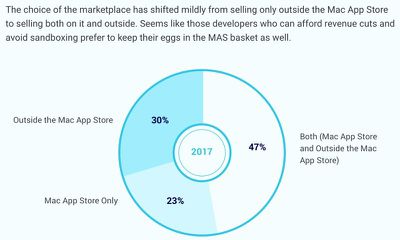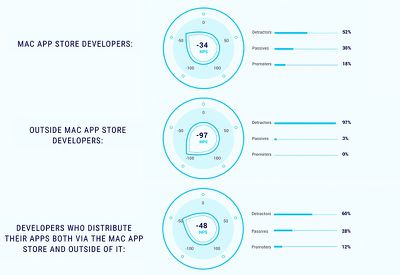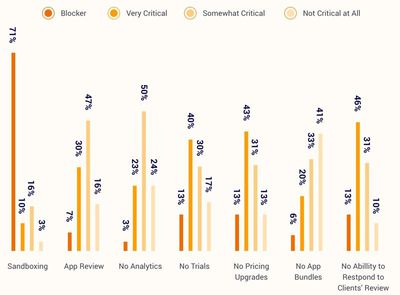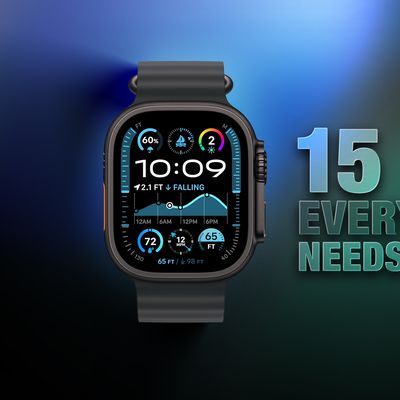Setapp, a company that offers a Mac app subscription service, recently polled 742 developers to get their thoughts on the Mac App Store and the state of Mac app development. The survey is a follow-up to a survey that was conducted last year, which concluded many Mac developers are unhappy with Apple's platform.
That same anti-Mac App Store sentiment can be seen in the results of this year's survey. Of Mac developers polled, just 23 percent use the Mac App Store as their sole distribution platform, while 47 percent use the Mac App Store alongside another distribution method. 30 percent don't bother with the Mac App Store at all. The number of developers using both the Mac App Store and another distribution method is up slightly from last year, but the Mac App Store only category is stagnant.

Developers who don't use the Mac App Store cite reasons like the long app review process, the 30 percent revenue split with Apple, and the inability to offer trials.
The majority of money made from Mac apps is made outside of the Mac App Store among developers polled. Revenue from the Mac App Store accounted for 44 percent of app earnings, while revenue from outside of the Mac App Store accounted for 56 percent.
Developers were asked how likely they were to recommend the Mac App Store as a primary distribution channel to a friend or colleague, and the results were tallied using a Net Promoter Score that can range from 100 (everyone recommends) to -100 (no one recommends). A higher negative score means a more negative opinion.
Mac App Store developers had Net Promoter Score (NPS) of -34, non-Mac App Store developers had a score of -97, and developers who sell their apps both in and outside of the Mac App Store had a score of -48.

69 percent of developers polled said that sharing 30 percent of their revenue with Apple was not worth it based on what the Mac App Store provides, while 31 percent said it was worth it. In 2016, 62 percent said not worth it and 38 percent said worth it.
Sandboxing, a lack of analytics tools, no app bundles, no upgrades, and no ability to respond to reviews were seen as major factors limiting developers' businesses. As of iOS 10.3 and macOS Sierra 10.12.4, developers have been able to respond to customer reviews, eliminating at least one factor keeping developers from using the Mac App Store.

On the plus side, developers were happy with improvements to the Mac App Store review process and the speed with which apps go through the review process, while opinions on Mac App Store communications, review guidelines, and the appeal process saw smaller positive changes.
Going forward, developers would like to see faster app approval times, more flexibility when it comes to Apple's sandboxing policies, better communication with the Mac App Store approval team, and clearer explanations when an app is rejected.
Additional topics, like the new subscription options, are covered in the survey and can be viewed over on the main survey page. There are also comparisons between the 2016 survey for a clearer look at the state of the Mac App Store.





















Top Rated Comments
1. It was waaaay faster and scanning your system at providing update results.
2. The updates list was clear and concise, with no ambiguity about what could be updated, without having to expand sub-installer lists.
3. The information it provided was far more useful and accessible, like whether or not the update required restart (was much easier to identify), and most importantly, download SIZE, BEFORE starting the download. That small piece of info was extremely useful for determining whether I was going to run an update now, overnight, or even at all.
4. It wasn't so buggy. The app store updater is often unresponsive, doesn't update status, and sometimes just hangs.
From what I understand it's also a pain in the ass for Mac developers. That sounds to me like it's a lose/lose proposition for everyone BUT Apple.
If Apple can't put effort into improving the MacAppStore, they should just get rid of it.
I prefer buying outside the MacApp Store. I can't remember the last app / or when I did buy something from there.